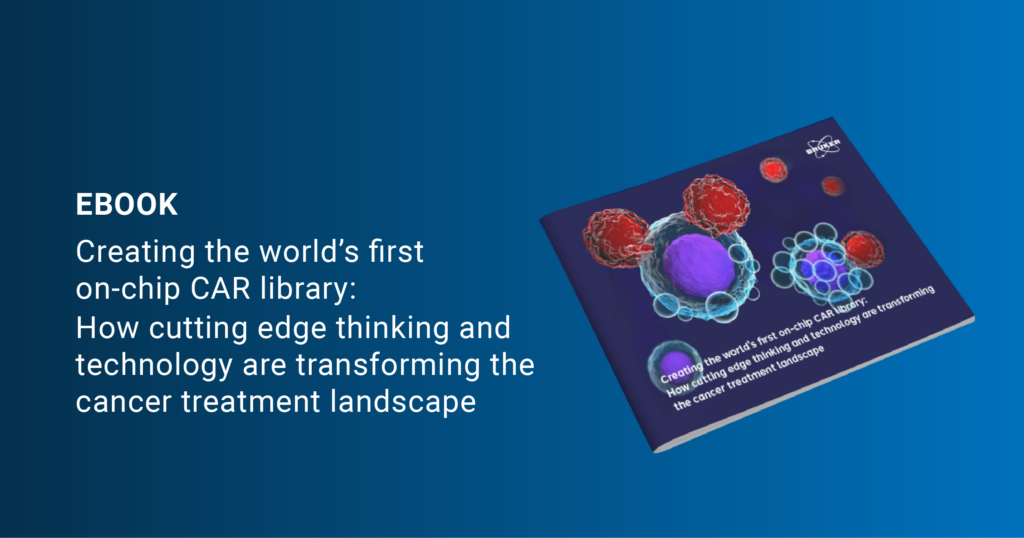In the field of oncology, chimeric antigen receptor (CAR)-T cell therapy is a focal point of innovative research that has the potential to revolutionize cancer treatment. In our new eBook, “Creating the World’s First On-Chip CAR Library: How Cutting Edge Thinking and Technology Are Transforming the Cancer Treatment Landscape,” we offer you the opportunity to delve into the leading-edge ideas and technology that are driving us towards a more promising future in cancer treatment.
The Promise of CAR-T Cell Therapy
CAR-T cell therapy has many promising implications. It involves modifying a patient’s own T cells to target and destroy cancer cells, holding the potential to combat various cancer types. Currently, it’s approved for use in haematological cancers, such as acute lymphocytic leukaemia (ALL), diffuse large B cell lymphoma (DLBCL), and multiple myeloma (MM). This transformative therapy has significantly improved patient outcomes in these areas and has paved the way for numerous clinical trials across the United States and Europe.
The Challenges in CAR-T Therapy Development
Despite the promises of CAR-T therapy, the challenges in its development are significant. Cancer is highly adaptable and diverse, requiring continuous exploration of new targets and candidates. Traditional discovery methods are complex, time-consuming, and often inefficient, relying on a trial-and-error approach that consumes valuable time and resources. This conventional process can involve phage display, the application of a DNA library, several rounds of panning, extensive washing, and concentration. Even after identifying potential candidates, the validation process often fails, making the development of CAR-T therapies a lengthy and resource-intensive endeavor.
The Innovative Solution
In our eBook, we introduce you to the National Center for Tumor Diseases at the German Cancer Research Center (Deutsches Krebsforschungszentrum / DKFZ), which is dedicated to making CAR-T therapy development more efficient. The DKFZ team is on a mission to accelerate the CAR-T therapy development pathway by creating the world’s first on-chip CAR library. This groundbreaking approach aims to open up a world of treatment opportunities and drastically reduce the time required for candidate discovery.
Bruker’s Role in the Revolution
At the heart of this innovative approach is Bruker’s OptoSelect®chip, which represents a significant evolution in cell therapy discovery. Featured on the Beacon® instruments, this technology allows the isolation and functional characterization of thousands of single cells simultaneously on one platform. It shifts the focus to function, significantly reducing the time needed to identify viable candidates and offering a rapid solution to overcome CAR-T development bottlenecks.
The Future of CAR-T Therapy
This new eBook provides insights into a groundbreaking development in the field of CAR-T therapy that has the potential to accelerate the creation of new, life-saving therapies. Decreasing candidate selection time not only expedites the development of CAR-T therapies but also enables research into a broad range of indications, including solid tumors. Moreover, it paves the way for personalized CAR-T therapy that can be tailored to individual patients’ needs, representing a promising future for the fight against cancer.

